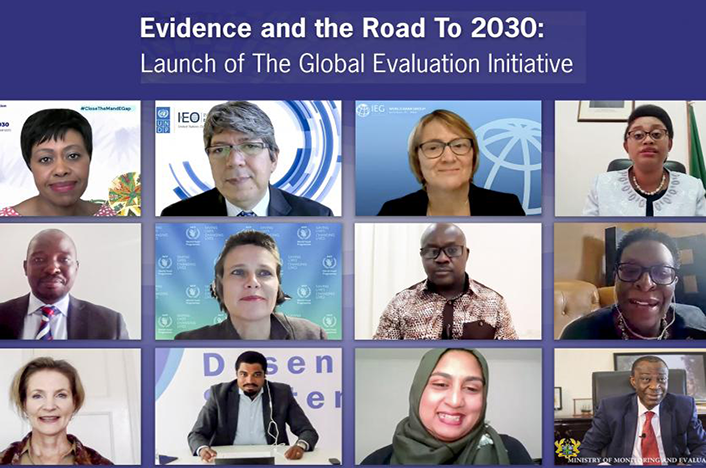
“The monitoring and evaluation process is essential for governance and the development of evidence-based policies,” announced Mozambique Vice Minster of Finance Dr. Carla Alexandra Oreste do Rosário Fernandes Louveir at the start of a virtual conference focused on the launch of the Global Evaluation Initiative and its potential role in Africa. “Monitoring and evaluation are powerful decision-making tools for managers,” added the Vice Minister.
The Global Evaluation Initiative (GEI) brings together a broad and inclusive coalition of governments, citizens and experts to close a global gap in monitoring and evaluation capacities. According to a recent report, more than half of all countries now have high-quality national development strategies and almost all of them are aligned with the Sustainable Development Goals (SDGs), but only one third of them have data and systems to track implementation of their policies.
Responding to an urgent need
A sense of urgency was palpable during the launch event, “Evidence and the Road to 2030,” which brought together government and independent evaluation experts from across Africa, as well as representatives of international organizations and donor countries. The Sustainable Development Goals were already off track as the 10-year countdown to the 2030 Agenda began this year, and the COVID-19 pandemic is derailing them further, threatening to push millions into poverty.
“We need reliable evidence to guide our path to economic recovery, “ said event participant Godfrey Mashamba, South Africa’s Deputy Director General of the Department of Planning and Monitoring and Evaluation.
Monitoring and evaluation (M&E) can deliver invaluable evidence on what is working and what is not. They can be a powerful compass, helping governments learn from experience and use the lessons to adjust course, scale or target public policies more effectively. There is strong demand from countries in Africa and around the world to strengthen their M&E capacities as critical for rebuilding better from the pandemic and getting back on track to the SDGs.
Linking national, regional and global knowledge
GEI aims to respond to the demand by building on the capacities, experiences and knowledge of local actors and matching these with coordinated support and global knowledge, according to representatives of two organizations at the heart of the partnership who spoke during the event: Alison Evans, Director-General of Evaluation at the World Bank Group, and Oscar A. Garcia, Director of the Independent Evaluation Office of the United Nations Development Programme (UNDP).
For example, Cabo Verde, a small country of 10 islands off Western Africa, has many sources of data but does not yet have the institutional capacity to process and take advantage of this information, according to panelist Gilson Pina, National Director of Planning at the Cabo Verde Ministry of Finance. GEI will help train and build the capacities of staff to use the data of a new M&E platform that his planning department is building, Pina said.
“The initiative’s goals coincide with our own goals,” Pina said during his intervention at the conference.
Beyond building basic capacity, GEI should serve to “support a culture of evaluation” and encourage shared progress for African countries, said panelist Abdoulaye Gounou, Head of Benin’s Office for the Evaluation of Public Policies and Analysis of Government Action.
“The partnership on evaluation is a very powerful tool for institutionalizing and promoting evaluation in our countries,” Gounou said. “We are learning through our peers and we are progressing together.”
Independent evaluators in Africa can also play a role in expanding M&E capacities in the region and developing African approaches to evaluation, said panelist Fazeela Hoosen, co-chair of the Young and Emerging Evaluators Network of the African Evaluation Association. As the next generation of evaluators, “Young and emerging evaluators are the ground or fertile soil to embed the seeds of what we have been talking about,” she said.
Watch a re-play of the Africa Launch of the Global Evaluation Initiative
Evidence and the Road to 2030: Launch of the Global Evaluation Initiative
Regional and global cooperation
GEI aims to collaborate with the diverse set of stakeholders involved in the development of M&E capacity, from government officials to independent evaluators, and to serve as a global platform for the curating and sharing of local and global M&E knowledge. The partnership has already been in touch with the African Evaluation Association (AfrEA), an umbrella organization for individual evaluators in countries that lack national evaluation associations, said panelist Rosetti Nabbumba of Uganda, president of AfrEA’s Board of Directors. GEI has begun talking with AfrEA about working together to compile a database of African evaluators.
“I’m looking forward to a very collaborative arrangement,” with GEI, Nabbumba said.
The Swedish International Development Agency (Sida) also has high expectations for GEI, with the hope that it will take the evaluation capacity agenda forward with a focus on country-led efforts according to panelist Pernilla Rafiqui, Sida’s Senior Program Manager for Capacity Development.
Rafiqui described GEI as “both timely and well conceptualized,” and added, “we expect GEI to contribute toward better policies for better lives for poor and vulnerable people, and we very much look forward to making this happen.”
In closing remarks, Dr. Anthony Akoto Osei, Ghana’s Minister for Monitoring and Evaluation, emphasized the urgent need in the uncertain context of COVID-19 for robust M&E systems that enhance the chances of success of government policies.
“The need for and use of evidence in support of decision-making have never been as important as it is now,” Dr. Osei said. “The required improvements in M&E need to be underpinned by what is already in place. The GEI is an example of that kind of strategy, in that it seeks to build on what is already there, and to operate collaboratively and through partnerships.”